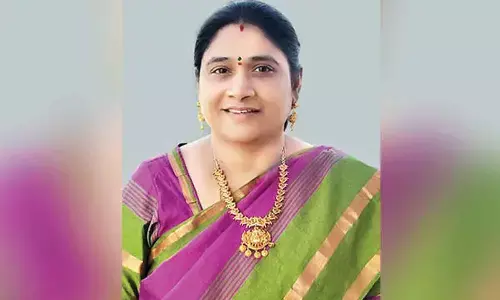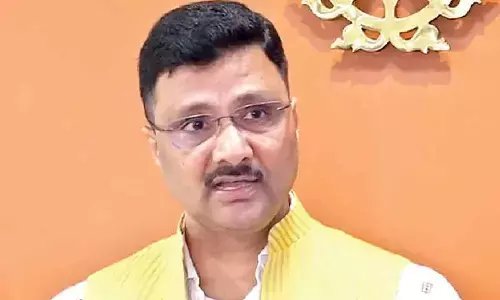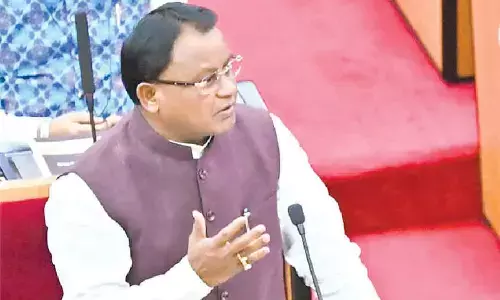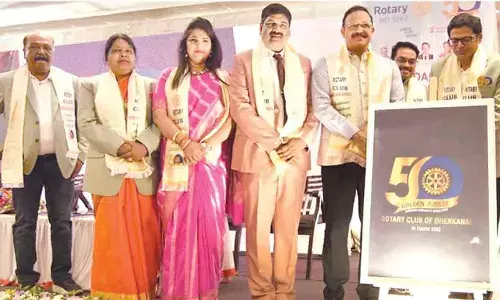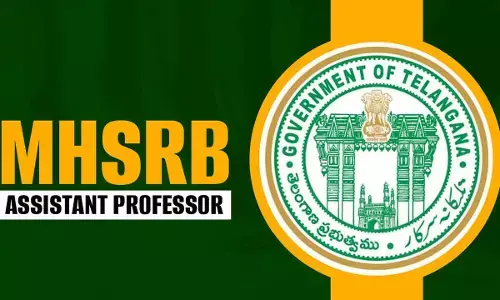Unique exponent of Harikatha
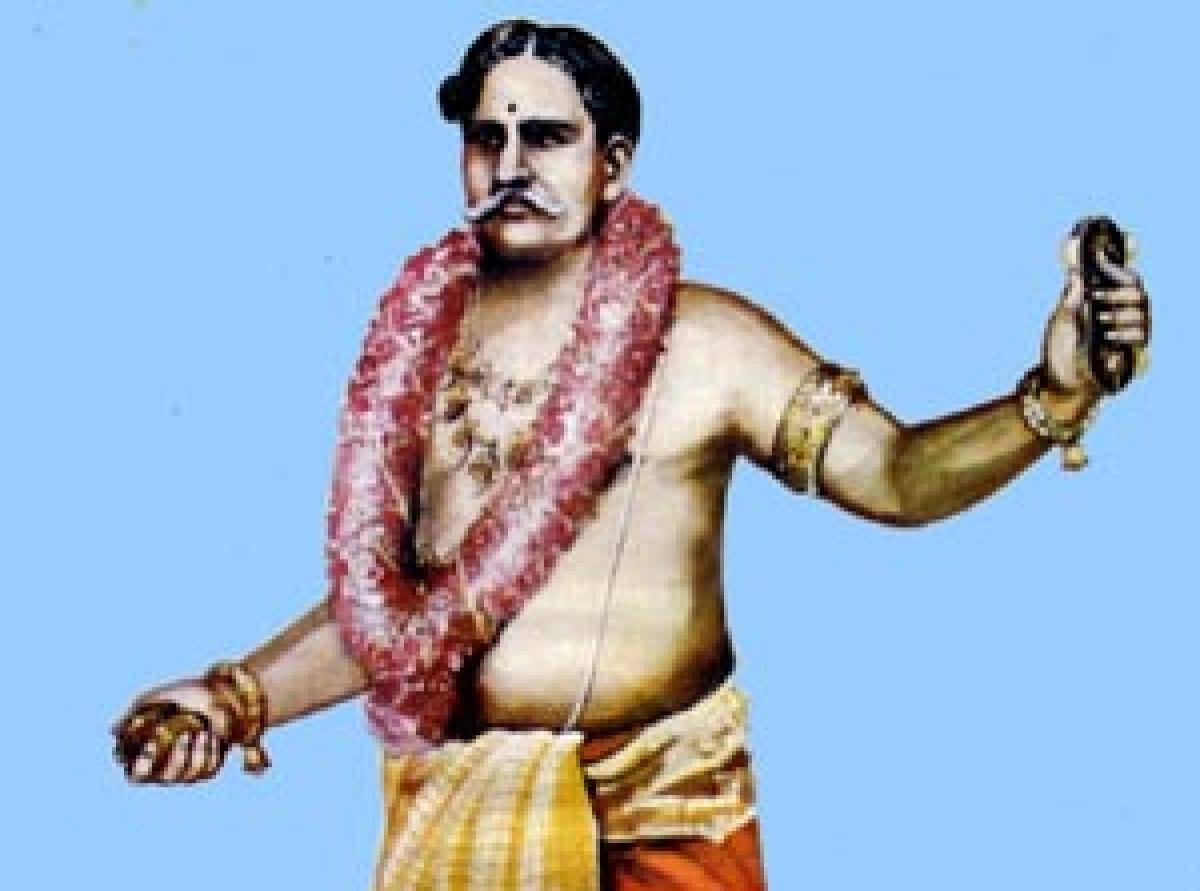
Adibhatla Narayana Das (1864-1945) is synonymous with Harikatha and vice versa. The Harikatha exponent was unique and no other exponent of this form of story-telling became as popular as him.
Adibhatla Narayana Das
Adibhatla Narayana Das (1864-1945) is synonymous with Harikatha and vice versa. The Harikatha exponent was unique and no other exponent of this form of story-telling became as popular as him. Narayana Das was described as Adibhattu for Harikatha Vangmayam, Kavisamrat for style of poetic rendition, expert in relating anecdotes which punctuate Harikatha, an encyclopedia for essaying all the nine emotions, a treasure house of music and literature and master of rhythm.
When we conjure up image of Adibhatla Narayana Das, it occurs immediately to our mind the famous Sanskrit quotation Sangeetamapi Sahityam Saraswatyaah Stanadwayam. In one way Narayana Das can be called as Pumbhaava Saraswat. He was a multi-faceted personality. He belongs to the league of saint-litterateurs. His scholarly command over several languages and knowledge of literature and ear for music and expertise in classical dance are immeasurable.
It is very rare to find such exemplary qualities in one person. His works entertained the learned and unlettered alike. He was called Father of Harikatha as there was no other artiste who could compare with him at that time. He was the front runner for penning Harikathas and for giving wide publicity to this art form. His command over rhythm was unusual. He penned Harikathas in the most difficult talas like Panchamukhi and Shanmukhi and rendered them in a way that earned plaudits even from renowned scholars.
He was not only an expert in music and dance, but also a polyglot whose knowledge of Sanskrit, English, Persian and Urdu qualified him to be described as a Mahavidwan. He held the people in awe with his command over logic, grammar, dharma sastras, meemamsa authoring several works on these subjects. Apart from his talent in rendering Harikathas, command over music, being a mellifluous singer, he was an exemplary poet who penned poetry and a flourishing form of poetry that thrived in royal courts (Kaavyam).
His command over various languages held people in awe for those who came across his multi-lingual translation work of ‘Omar Khayyam’. An imposing personality that he was, Narayana Das had striking physical features with eyes, nose and lips dominating other features. When he danced sporting a smile or when he jumped while dancing or when he raised his voice yelling Sambho at the top of his voice, he mesmerised every one present at his concert.
This multi-faceted genius came to the fore when he quoted with ease various anecdotes and examples in Telugu, Sanskrit, Arabic, Persian and Tamil and rendered poetry extempore. He translated some suktas from the Rig Veda into Telugu. He was a famous veena exponent. He believed that lacing literature with music and dance – an ensemble of all the three art forms as ‘sangeeta pradarsanam’ and worshipped true music like Sri Sivanarayana Teertha. With his command over swara and raaga, he tested the skills of accompanying veena and percussion artistes. Narayana Das towered over veena and percussion artistes not only in physical sense but also intellectually.
In the court of Mysore Maharaja, he stole the heart of the king as well as the scholars in his court with his expertise in playing veena and received felicitations. Later, he won the heart of Ananda Gajapati Maharaja, the then ruler of Vizianagaram with his knowledge and skill in music leading to his appointment as first Principal of Vijayarama College of Music (1919) and shared his knowledge in music and literature with his disciples for about 17 years. He was honoured by several world renowned personalities like Rabindranath Tagore and Sarojini Devi besides receiving felicitations from several Maharajas.
The Harikathas penned by him include Janaki Sapatham, Gajendra Moksham, Prahladacharitra, Dhruvopaakhyaanam, Markandeyopaakhyaanam, Bheeshmacharitram, Savitricharitram and Yadardha Ramayanam. Besides, he also authored Sriramachandra Satakam and Kasisatakam, works of poetry like Omar Khayyam and Batasaari. He also authored a philosophical work titled Jagajjyoti and a romantic work called Tarakam and work on music titled Navarasatarangini.
Notable disciples of Narayana Das were: Vajapeyajula Subbayya Dasu, Neti Lakshminarayana Bhagavatar (Vijayawada), Nemani Varahala Dasu, Vedanabhatla Venkata Ramanayya, Vadlamani Narasimha Dasu, Pillalamarri Rama Das Bhagavatar etc. But only a few of his disciples could glean at least some of Narayana Das’ unusual dancing skills. They were: Vajapeyajula Subbayya Dasu, Neti Lakshminarayana Bhagavatar, Vadlamani Narasimha Dasu and Karuru Krishna Dasu.
His love for his disciples was unmatched. Neti Lakshminarayana Bhagavatar was felt honoured to have dined with Narayana Das during his tutelage. He used to provide all amenities to his disciples either at his home or the houses of well off sections of society. He used to give them money to meet pocket expenses. To drive away fear in the hearts of his disciples, he used to dance on streets asking the disciples to sing and dance. He used to teach niceties of Harikatha rendition then and there on the streets.
Famous scholars like Tirupati Venkata Kavulu, Chellapilla Venkata Sastry eulogised Narayana Das’ unabashedly. His idol was installed on January 25, 1951 by his disciples Neti Lakshminarayana Bhagavatulu, Vajapeyajula Subbayya Bhagavatulu, Peddinti Suryanarayana Deekshitulu as per Agama Sastra rituals on the premises of Lord Siva temple at Satyanarayanapuram in Vijayawada. His wide network of disciples annually celebrates his birth anniversary (Sravana Bahula Chaturdasi) and observe death anniversary (Pushya Bahula Panchami). Perhaps to rub shoulders with saint-composer Thyagaraja in the heavens or to lock horns with him in a scholastic debate, Adibhatla Narayana Das, the lengendary Harikatha exponent, passed away on the same tithi as that of Thyagaraja Pushya Bahula Panchami.
By Yanamandra Venkata Krishnaiah


